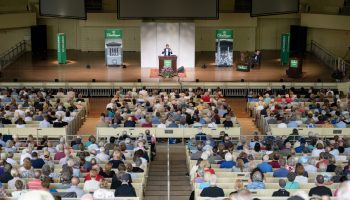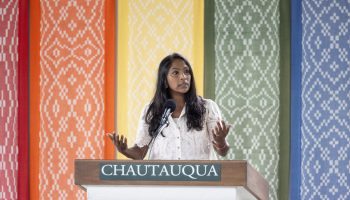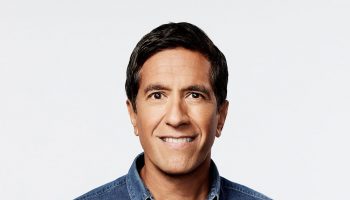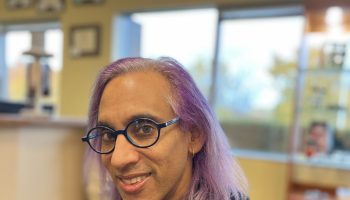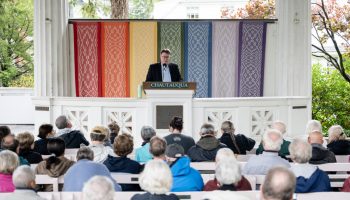David Petraeus is a warrior, but he also understands the importance of making and keeping the peace.
What happens after a battle is won can be as important as winning that battle in the first place. In a series of recent public statements after a long silence, Petraeus has been saying inclusion and tolerance are the keys to rebuilding a broken society and to maintaining its lasting health.
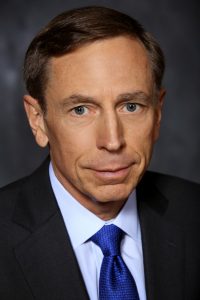
The retired four-star Army general, who commanded American and coalition forces in both Iraq and Afghanistan, is the highest-profile military figure to have emerged after the 9/11 attacks in 2001. During a 37-year military career, Petraeus won numerous medals and awards, including the Distinguished Service Medal, the Bronze Star and the Combat Action Badge. His leadership in what became known as “the surge” in Iraq in 2007 and 2008 is credited by many historians as reversing a downward spiral of violence verging on civil war and establishing a semblance of stability to the country.
At 10:45 a.m. August 18 in the Amphitheater, he will speak about the role of the United States in the world and join in a discussion with the author Wes Moore, himself a decorated former Army officer, as part of the theme for Week Eight, “War and Its Warriors: Contemporary Voices.”
Petraeus served as director of the Central Intelligence Agency, from September 2011 until his resignation in November 2012 after the disclosure of an extramarital affair. In 2015, he pleaded guilty to a misdemeanor charge of mishandling classified information, was fined and sentenced to two years of probation.
Since then, Petraeus has kept a low public profile as a partner in the global investment firm KKR and chairman of the KKR Global Institute. But in the past few months, he has stepped forward to offer his thoughts on American military policy in Iraq and the dangers of alienating Muslims at home and abroad.
Petraeus re-emerged to take part in the national security conversation in June with an appearance before a group of about 300 military, business and policy leaders in Washington.
In a speech to the group, organized by the U.S. Global Leadership Coalition, Petraeus vigorously defended the use of American military force abroad, arguing that if the United States did not become involved in unstable regions of the world, Islamist extremists would, according to The Washington Post.
“We’ve got to be involved, and truth is where we are not, the situation tends to get worse,” the Post quoted him as saying.
In an op-ed for the Post published last week, Petraeus expanded on that argument, warning that the United States must work with various factions in Iraq to establish a stable alternative to the Islamic State in the city of Mosul, which a coalition of Arab and Kurdish forces seem poised to retake after it was overrun in 2014 and declare the ISIS capital in Iraq. Defeating ISIS in Mosul presents its own challenges as the Iraqis must establish a stable and inclusive government, Petraeus wrote.
“The challenge of Mosul and Nineveh [the province in which Mosul is located] is the considerable number of ethnic groups, religious sects tribes and other elements that make up the province,” Petraeus wrote, stressing that nurturing a spirit of religious and ethnic tolerance is fundamental to a stable society.
Inclusion is a concept that Petraeus sees as critical not only for any chance of success in rebuilding Iraq, but in healing old wounds and protecting against future divisions. As he sees it, the importance of tolerance and inclusion applies to the West and to the United States, as well.
In one of his first major public statements in several years, Petraeus warned against divisiveness in an article for The Washington Post in May.
“I have grown increasingly concerned about inflammatory political discourse that has become far too common both at home and abroad against Muslims and Islam, including proposals from various quarters for blanket discrimination against people on the basis of their religion,” he wrote.
“Setting aside moral considerations, those who flirt with hate speech against Muslims should realize they are playing directly into the hands of al-Qaeda and the Islamic State,” Petraeus wrote in the Post. “The terrorists’ explicit hope has been to provoke a clash of civilizations — telling Muslims that the United States is at war with them and their religion. When Western politicians propose blanket discrimination against Islam, they bolster the terrorists’ propaganda. At the same time, such statements directly undermine our ability to defeat Islamist extremists by alienating and undermining the allies whose help we most need to win this fight.”

